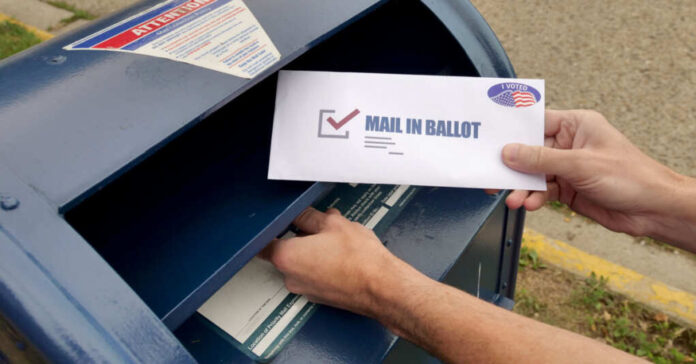
Delaware Democrats received a crushing blow to their mail-in voting strategy when Superior Court Judge Mark Connor said the current absentee mail-in vote laws and expanded early voting are “inconsistent” with the state’s constitution and “therefore cannot stand.”
Michael Mennella, a Delaware elections inspector, and Gerald Hocker, a Republican lawmaker and the state’s Senate Minority Leader, are suing Delaware for its laws permitting early voting and permanent absentee status. And it’s looking as though they will emerge as winners in the case.
According to Delaware’s Constitution, voters can only request absentee status for particular elections if they cannot attend the polls in person. However, Conner highlighted that under a law passed in 2019, individuals who voted absentee due to an illness in one year could maintain their absentee voting eligibility for all subsequent general elections.
Connor’s ruling upheld a 2022 decision that declared Election Day registrations and universal mail-in voting unconstitutional. The state Supreme Court ruled that the vote-by-mail statute unconstitutionally broadened eligibility for absentee voting, while same-day registration clashed with the constitutionally defined registration periods.
Further, Connor found that a law allowing in-person voting ten days before election day violated a constitutional provision specifying that general elections must occur on the Tuesday following the first Monday in November. Connor notes that, per Delaware’s Constitution, only one day is set aside for voting, not “any series of days the General Assembly sees fit.”
At the heart of the argument heard by Connor was the state attorney’s insistence that the General Assembly’s voting laws somehow “secure secrecy and the independence of the voter, preserve the freedom and purity of elections, and prevent fraud, corruption, and intimidation.” According to Connor, the state failed to show how their laws around absentee ballots and early voting accomplish this goal.
Lacking the substance to win the court case, Delaware Democrats are attacking the process instead. The state attorneys said Conner shouldn’t oversee the case because Mennella didn’t follow the rules for moving it from another court. However, the judge didn’t agree, nor did he agree with the defense’s argument that the defendants faced a statute of limitations.
In 2010, the General Assembly passed a law allowing permanent absentee voting in some instances. In 2019, the legislature, controlled by Democrats, passed an early voting law that was subsequently used in 2020’s general election, for the midterms in 2022, and a special election.
In Delaware, the process for amending the constitution follows specific steps. Initially, an amendment can be proposed in either the Senate or the House of Representatives. If two-thirds of all the members elected to each house agree to the proposed amendment, it is recorded in their journals along with the yeas and nays. The proposed amendment must then be made public not more than 120 days before the next general election and not less than 90 days before the following general election, as specified by an act of the General Assembly. Following the election, during the General Assembly session, the proposed amendment must once again receive the agreement of two-thirds of all the members elected to each house. Only after this approval process does the proposed amendment become a part of the Delaware Constitution.
Democrats in the state have made numerous attempts to broaden voting access through legislation rather than amending the Delaware Constitution. While Democrats have sufficient Senate votes to pass constitutional amendments without GOP support, they lack the numbers in the House to achieve the two-thirds vote necessary to pass the amendment.
But Delaware is not the only state facing election law changes and challenges. Since the 2020 election, several states have significantly revised their voting laws, reshaping the landscape of electoral processes. A report by the Voting Rights Lab explores the changes seen in eight battleground states. Among these states are Arizona, Georgia, North Carolina, New Hampshire, and Wisconsin, where the margins of the 2020 presidential election were often less than two percent. The alterations to voting policies in these states, such as strict mail ballot ID laws in North Carolina and the reinstatement of in-person voting requirements in New Hampshire, can potentially sway election outcomes in close races.
In Georgia, new restrictions on mail voting, including ID requirements and limitations on drop boxes, have been implemented. At the same time, voters in Wisconsin may face hurdles in returning mail ballots, pending litigation that could influence the rules ahead of the 2024 election.
The Delaware lawsuit challenging early voting and absentee ballot laws appears to be making progress, reflecting a broader pattern of election law changes happening across the country. With 56% of voters expressing concerns about potential cheating impacting future elections, there’s a growing worry about election integrity. However, if voters and election officials continue scrutinizing and discussing voting laws, there may be hope for a fair election in 2024.
